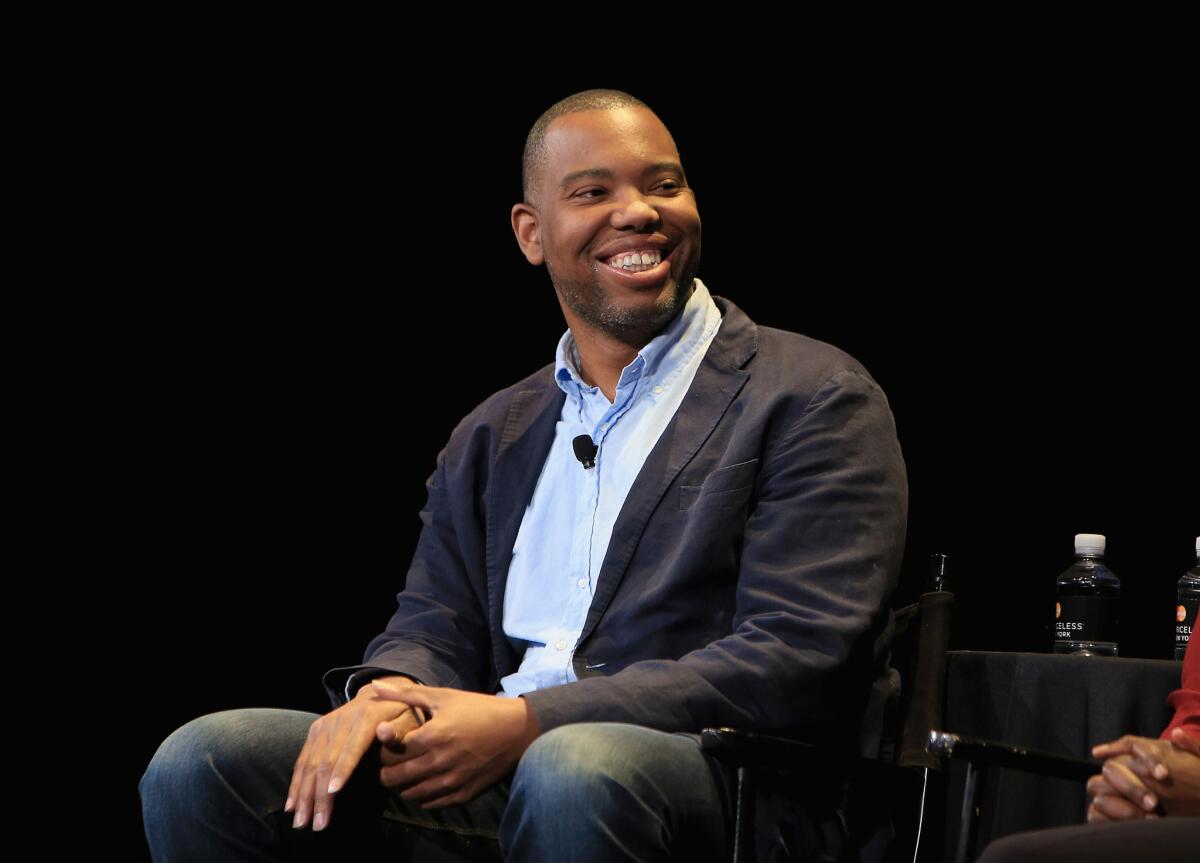Ta-Nehisi Coates’ meditation on race in America wins National Book Award for nonfiction

Ta-Nehisi Coates has won the National Book Award for nonfiction for “Between the World and Me,” a timely rumination on race in America.
- Share via
New York — Ta-Nehisi Coates marked another professional triumph Wednesday night by winning the National Book Award for nonfiction for “Between the World and Me,” his timely, bestselling meditation on race in America.
In an acceptance speech that prompted a standing ovation from the black tie-clad crowd at Cipriani Wall Street in New York, Coates dedicated the award to Prince Jones, a Howard University classmate who was killed while unarmed by a police officer and who figures prominently in the memoir, written as a letter to Coates’ teenage son.
As Coates explained, the officer responsible for Jones’ death was never disciplined for the killing.
“I’m a black man in America. I can’t punish that officer. ‘Between the World and Me’ comes out of that place,” said Coates, a national correspondent for the Atlantic who was awarded a MacArthur “Genius” Fellowship in September.
“We are in this moment where folks are recording everything on their phones. Every day you turn on the TV and you see some sort of violence being directed at black people,” Coates said, alluding to controversial incidents caught on tape, including the death of Eric Garner, the arrest of Sandra Bland and the killing of Walter Scott, an unarmed man shot and killed in South Carolina this year.
“I have waited 15 years for this moment, because when Prince Jones died, there were no cameras, there was nobody looking.”
While Coates’ victory was hardly a surprise, there was at least one major upset at the event, American publishing’s biggest-ticket literary award.
In a completely surprising outcome, Adam Johnson claimed the award for fiction with his short story collection, “Fortune Smiles.” Johnson, who beat out such favorites as Hanya Yanagihara for “A Little Life” and Lauren Groff for “Fates and Furies,” appeared as stunned as anyone by the victory.
“I told my wife and my kids, ‘Don’t come across America because this is not going to happen,’” said Johnson, who teaches at Stanford.
Neal Shusterman won the award for young people’s literature for “Challenger Deep,” a
novel about a teen struggling with mental illness that was inspired by his son’s experiences.
“We have to open up and talk about [mental illness] more so we can understand it better, and I hope this book helps to do that,” he said, inviting his son to join him onstage.
Robin Coste Lewis was named the winner of the poetry prize for her debut collection, “Voyage of the Sable Venus,” a reflection on the black female form throughout history.
Novelist Don DeLillo was awarded the medal for distinguished contribution to American letters. In presenting the award to DeLillo, author Jennifer Egan praised his masterful dialogue, “epic” sensibility and the “chutzpah in the sheer range of his books.” She also touched upon a recurring topic throughout the night: the future of books and literature in the digital era.
Following a standing ovation, the author of “White Noise,” “Underworld” and “Falling Man” took to the stage and, in brief remarks, spoke of the “the power of memory that a book carries with it.”
Calling himself a “grateful reader,” DeLillo paid homage to recently deceased writers including Peter Matthiessen and E.L. Doctorow -- who won the same prize in 2013 -- as well as earlier heroes Dylan Thomas and Carson McCullers.
James Patterson, winner of the Literarian Award for Outstanding Service to the American Literary Community, joked that as the writer of bestselling mass-market fiction in a room full of highbrow types, he was “the Big Mac at Cipriani.”
The name of the prize also sparked an ongoing joke at the hands of host humorist Andy Borowitz about the meaning of the word “literarian,” which Harold Augenbraum, the outgoing executive director of the National Book Foundation, helpfully clarified.
“A literarian is a person who dedicates his or her life to the study or enjoyment of literature,” he said -- to a room full of literarians.
More to Read
Sign up for our Book Club newsletter
Get the latest news, events and more from the Los Angeles Times Book Club, and help us get L.A. reading and talking.
You may occasionally receive promotional content from the Los Angeles Times.










